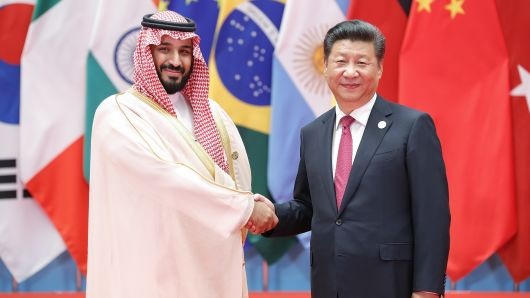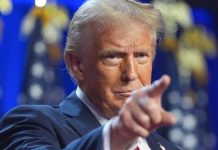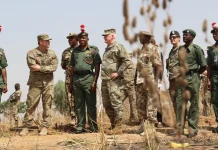- A high-profile tour by Crown Prince Mohammed bin Salman last month culminated in multi-billion dollar investment pledges for China, India and Pakistan in sectors including infrastructure and energy along with promises of increased trade and security cooperation.
- Riyadh is strengthening and diversifying its international relationships based on economic and geopolitical interests, regional experts say.
- In a post-Khashoggi world, the kingdom is working to ensure it has a range of partnership options at its disposal.
Saudi Arabia is aggressively expanding its international relationships, and that will have inevitable consequences for the United States and its influence in the country.
A high-profile tour by Crown Prince Mohammed bin Salman last month culminated in pledges of $20 billion worth of investment in longtime partner Pakistan, $28 billion in economic accords with China and an open-ended goal to invest $100 billion in India, along with promises of increased trade and security cooperation.
In a post-Khashoggi world — where Riyadh’s longtime bond with its foremost security ally, Washington, faced its biggest crisis in years over human rights issues — the kingdom is working to ensure it has a range of options at its disposal.
Saudi Arabia also needs a survival strategy: With falling oil prices and a highly fossil-fuel dependent economy, it’s racing against the clock to diversify its revenue streams and bolster partnerships with larger powers to secure trade and security alliances. This pursuit is set to continue with help from the U.S., but it will also foster greater engagement with the East — both for economic and geopolitically strategic aims.
An economic win-win with China
Sharply heightened scrutiny and criticism from the West means that “Saudi Arabia needs the buy-in from major Asian economic powers now more than ever,” Ian Bremmer, president of the Eurasia Group, recently wrote in Time Magazine.
Numerous European and American policymakers have sought to blame the crown prince for his alleged role in the October murder of Saudi journalist Jamal Khashoggi, a charge the monarchy denies. The governments of Pakistan, India and China, by contrast, haven’t uttered a peep about the killing.
“There is little doubt that Saudi is building alternative sources of support in the event that the U.S. becomes a less reliable ally.”
-Hasnain Malik, Global head of equity research and strategy, Exotix Capital
Riyadh’s China and India investments are primarily economic at this point, says Hasnain Malik, global head of equity research and strategy at Exotix Capital in Dubai. They serve to deepen trade links with the fastest-growing markets for Saudi oil, though some experts have questioned whether and when all these pledged projects will actually happen.
But significantly, they also serve “the need to strengthen geopolitical relations to the East in preparation for a long-term scenario where the U.S. reduces commitment to Saudi security, leaving it to contend with Iran more self-sufficiently,” Malik told CNBC.
While in China, the Saudi crown prince emphasized efforts to link Saudi Vision 2030 investments with those of Beijing’s expansive Belt and Road initiative, and Chinese President Xi Jinping called for developing deeper ties through a China-Gulf Cooperation Council free trade zone. China is already the kingdom’s largest trading part
The Saudis also signed a contract last year with Chinese telecommunications giant Huawei to jointly develop the kingdom’s 5G network, against U.S. warnings.
Chinese competition with the US?
But will the partnership upset America’s dominance in the region? That’s up for debate.
Risk analysis firm Stratfor, in a late February brief, described the revived pledges of partnership as highlighting “China’s growing involvement in the Middle East and its attempts to exploit tensions between the United States and Saudi Arabia by advancing its own economic interests with Riyadh.”
Others maintain China is nowhere near America in terms of its influence and power in the Gulf region.
“The Chinese at least so far don’t seem to be willing to play a role as competitor with the U.S. in Middle East security issues. My read of them is they want to stay out of the politics,” said Gregory Gause, professor and head of the International Affairs Department at Texas A&M University’s Bush School of Government.
Saudi prince: Nuclear energy market is open Saudi prince: The nuclear energy market is open
9:34 AM ET Sun, 17 Feb 2019 | 02:50
Rather, Beijing’s eye is on economic expansion. “They want to be an energy purchaser, and maybe an energy investor,” Gause said. “But they don’t want to pick sides between Iran and Saudi Arabia.” China was one of eight countries granted a waiver last fall for U.S. sanctions on Iranian oil.
China began building the Middle East’s first armed drone factory in Saudi Arabia last year, and weapons experts now suspect Chinese support for a ballistic missile facility that was spotted by satellite imagery in the Saudi desert, which Riyadh has yet to acknowledge.
But in terms of encroaching on America’s security relationship with the kingdom, “They can’t yet,” said Gause. “They just don’t have the capabilities to project power into the Gulf the way the U.S. does.”
The U.S. military has bases in every single Gulf Cooperation Council country; China has none. China accounted for 1.5 percent of all Saudi arms imports over the last five years; the U.S. accounted for more than half.
“It is too early to describe this as a dash for independence from the U.S.,” Malik said. “However, there is little doubt that Saudi is building alternative sources of support in the event that the U.S. becomes a less reliable ally.”
Congress vs. Trump on the Saudi relationship’s future
Shortly after the crown prince’s Asia tour, President Donald Trump’s son-in-law and advisor Jared Kushner, along with other U.S. officials, visited Riyadh to discuss cooperation between the two countries, the elusive Israeli-Palestinian peace plan, and “economic investment,” according to a White House readout.
Overtures of support from the White House and planned changes to U.S. weapons export regulations reflect the U.S. commitment to keep offering the Saudis the partnership they’ve come to know for more than 70 years.
But this is happening while pressure mounts from Congress to end support for Saudi Arabia’s offensive in Yemen and condemn the crown prince’s actions — with some lawmakers calling for his removal from the Saudi line of succession altogether.
As momentum continues to build in Congress and the Democrat-led House of Representatives, messages toward Saudi Arabia will be mixed, incentivizing the young crown prince to continue his pivot eastward toward countries that are less likely to field criticism against his controversial policies.
And these developments are likely to keep Washington on its toes. Put bluntly by Eurasia Group’s chief Middle East analyst Ayham Kamel, “The crown prince’s tour in Asia is meant to signal to the West that he has options to reorient if they intend to pressure the King to replace him.”












